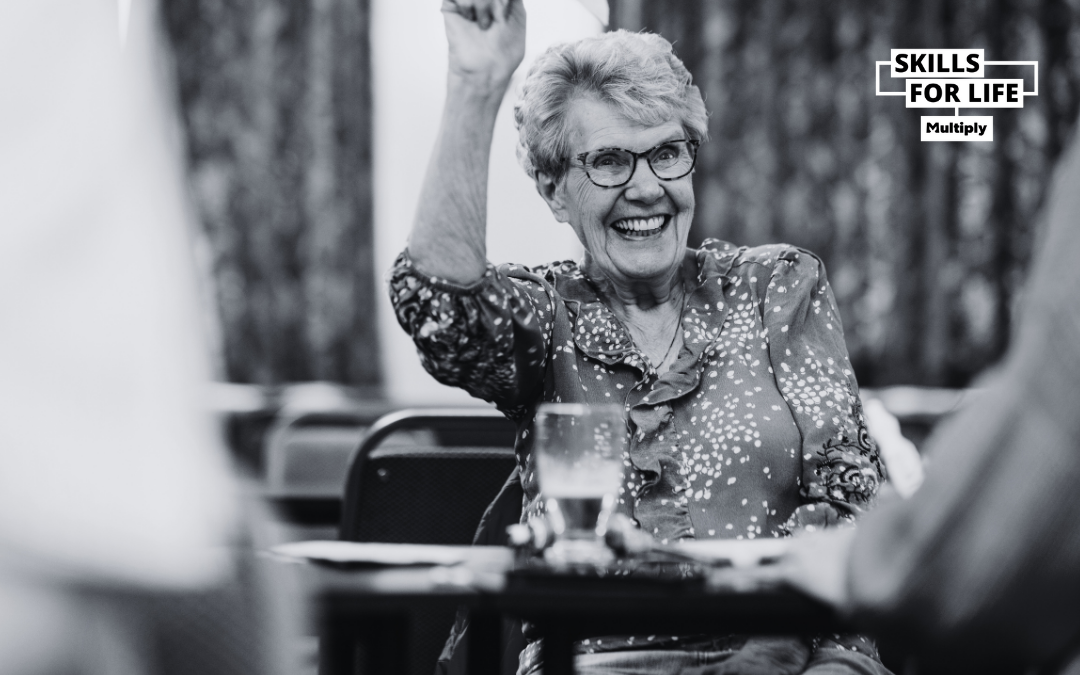In a world that moves faster by the day, it is all too easy to overlook those who have given so much to society, the older generation. Retirement homes, filled with rich histories and invaluable life experiences, are often places where learning is seen as something of the past. But at Educationwise, we believe learning should be a lifelong journey, not just a phase of youth. That belief was at the heart of why we undertook our Multiply contract with Skills for Life in retirement homes.
Why Retirement Homes?
When people think about education, they picture schoolchildren, university students, or young professionals looking to upskill. Rarely do they consider the elderly, despite the fact that learning has been proven to enhance cognitive function, boost confidence, and provide a profound sense of purpose at any age.
Retirement homes can, at times, become places of isolation, where days blend into one another and opportunities to engage meaningfully with the world outside begin to dwindle. But what if we could reignite a spark? What if we could empower these individuals with new skills that give them confidence and joy in their everyday lives?
The Power of Learning at Any Age
Our Multiply contract focused on numeracy, a fundamental skill that underpins so much of modern life. Many older adults face challenges with numeracy, which can impact their confidence in daily life activities such as handling money, reading timetables, or understanding measurements. These sessions aimed to gently reintroduce numeracy in a fun, relaxed, and non-intimidating way, helping residents stay mentally active.
During our monthly visits to the residential home, we brought numbers to life through engaging activities designed to support cognitive function, build confidence, and promote social interaction. These sessions were more than just about maths, they were about enhancing everyday skills, encouraging connections, and making learning an enjoyable experience for all residents.
Each session was carefully designed with a variety of activities that focused on different numeracy skills:
Enhancing Number Recognition
Using dice-based activities, residents became more familiar with numbers in a playful and stress-free way. Frequent exposure to numerical symbols in a game-like setting helped improve their ability to recognise and identify numbers.
Enhancing Cognitive Stimulation
Simple number-related games stimulated cognitive functions, helping maintain or improve mental agility. Whether it was basic arithmetic puzzles or number-matching exercises, these activities helped keep the mind sharp and engaged.
Developing Pattern Recognition
Residents worked with basic sequences and shapes, such as counting by twos or identifying similar shapes, helping them improve their ability to make logical connections and predictions, strengthening their reasoning skills.
Improving Spatial Awareness
Understanding size, shape, and positioning is key to navigating everyday environments. Activities involving spatial relationships, such as arranging objects in order, helped improve this vital skill.
Reinforcing Basic Arithmetic Skills
Through interactive dice games and number puzzles, residents practised addition, subtraction, and other fundamental maths skills in an engaging way. These activities not only reinforced their memory but also increased confidence in handling numbers.
Fostering Social Interaction
These sessions were a great opportunity for residents to engage with each other and collaborate in group exercises, encouraging teamwork and cooperation.
More Than Just Numbers
What we saw in these sessions went beyond numeracy skills. We witnessed residents light up as they grasped a new concept, shared stories of how they used numbers in their younger years, and even developed a newfound sense of community with others in the home. These classes were not just about learning, they were about connection, dignity, and showing that no one is ever too old to grow.
Too often, older adults are placed on the fringes of society, left out of conversations about progress and innovation. But they have so much to offer, and we owe it to them to provide opportunities to continue learning, to remain engaged, and to feel valued.
A Closing Chapter
Our work with Multiply and Skills for Life in retirement homes has now come to an end, but its impact remains. The response was overwhelmingly positive, and we are grateful to have played a role in bringing meaningful learning experiences to this often-overlooked audience.
Education should not have an expiry date. It should be a lifelong gift, accessible to all, regardless of age. Though this particular initiative has concluded, we remain committed to finding new ways to support lifelong learning and ensure that every individual, no matter their stage of life, has the opportunity to learn, grow, and feel valued.
We are proud of what we accomplished, and we hope it inspires others to rethink the way we approach education for all generations. Because everyone deserves the chance to learn, grow, and feel valued, at any stage of life.

